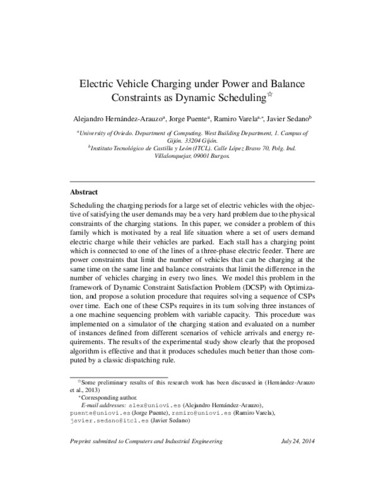Electric vehicle charging under power and balance constraints as dynamic scheduling
Autor(es) y otros:
Palabra(s) clave:
Scheduling electric vehicles charging
Dynamic Constraint Satisfaction Problems
Power and balance constraints
One machine sequencing
Tardiness minimization
Fecha de publicación:
Editorial:
Elsevier
Versión del editor:
Citación:
Descripción física:
Resumen:
Scheduling the charging periods for a large set of electric vehicles with the objective of satisfying the user demands may be a very hard problem due to the physical constraints of the charging stations. In this paper, we consider a problem of this family which is motivated by a real life situation where a set of users demand electric charge while their vehicles are parked. Each stall has a charging point which is connected to one of the lines of a three-phase electric feeder. There are power constraints that limit the number of vehicles that can be charging at the same time on the same line and balance constraints that limit the difference in the number of vehicles charging in every two lines. We model this problem in the framework of Dynamic Constraint Satisfaction Problem (DCSP) with Optimization, and propose a solution procedure that requires solving a sequence of CSPs over time. Each one of these CSPs requires in its turn solving three instances of a one machine sequencing problem with variable capacity. This procedure was implemented on a simulator of the charging station and evaluated on a number of instances defined from different scenarios of vehicle arrivals and energy requirements. The results of the experimental study show clearly that the proposed algorithm is effective and that it produces schedules much better than those computed by a classic dispatching rule
Scheduling the charging periods for a large set of electric vehicles with the objective of satisfying the user demands may be a very hard problem due to the physical constraints of the charging stations. In this paper, we consider a problem of this family which is motivated by a real life situation where a set of users demand electric charge while their vehicles are parked. Each stall has a charging point which is connected to one of the lines of a three-phase electric feeder. There are power constraints that limit the number of vehicles that can be charging at the same time on the same line and balance constraints that limit the difference in the number of vehicles charging in every two lines. We model this problem in the framework of Dynamic Constraint Satisfaction Problem (DCSP) with Optimization, and propose a solution procedure that requires solving a sequence of CSPs over time. Each one of these CSPs requires in its turn solving three instances of a one machine sequencing problem with variable capacity. This procedure was implemented on a simulator of the charging station and evaluated on a number of instances defined from different scenarios of vehicle arrivals and energy requirements. The results of the experimental study show clearly that the proposed algorithm is effective and that it produces schedules much better than those computed by a classic dispatching rule
Patrocinado por:
This research has been supported by the Spanish Government under research Projects TIN2010-20976-C02-02 and TIN2013-46511-C2-2-P, by the ITCL under Contract FUO-EM-075-13 an by the Principality of Asturias under Contract FC-13-COF13-035
Colecciones
- Artículos [37321]
- Informática [870]
- Investigaciones y Documentos OpenAIRE [8282]
Ficheros en el ítem




